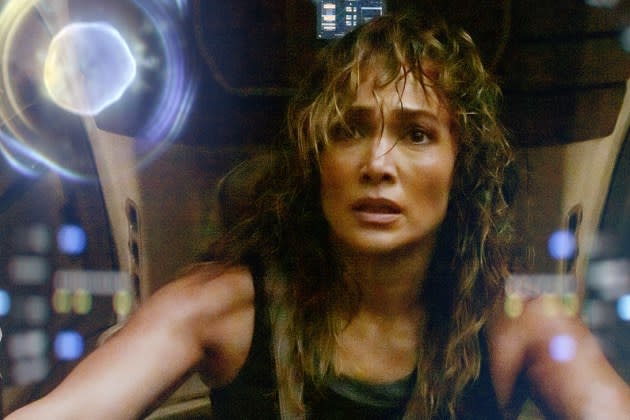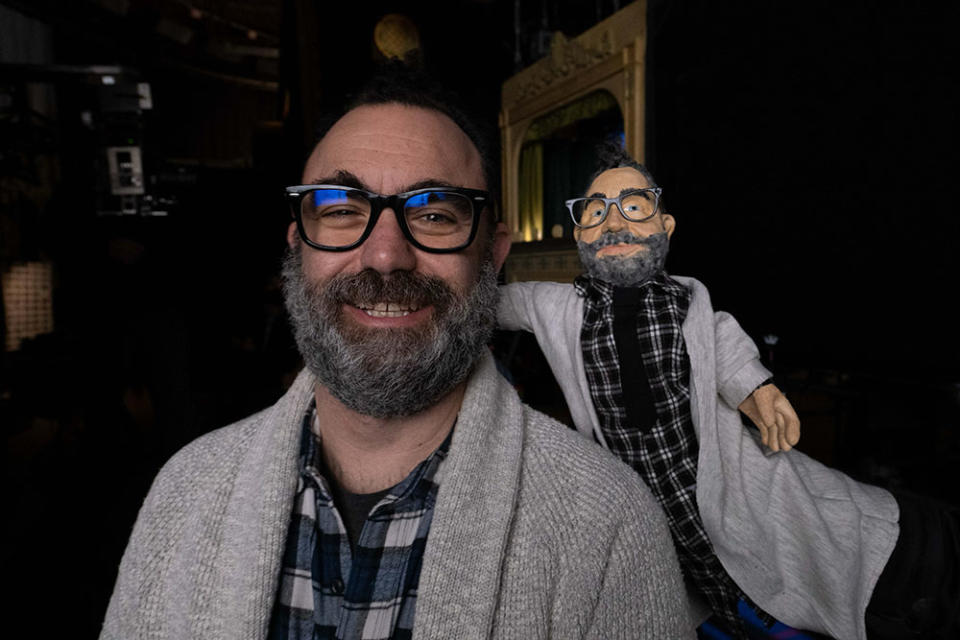‘Atlas’ Writer Aron Eli Coleite Reveals Original Idea for a ‘Blade Runner’-Style Opening

[This story contains spoilers for Atlas]
A movie begins, and Jennifer Lopez opens a suitcase to reveal a robotic head, which she proceeds to interrogate.
More from The Hollywood Reporter
How’d that head get in the suitcase? Why is Jennifer Lopez talking to it? The audience doesn’t yet know, but hopefully they are intrigued.
That’s how screenwriter Aron Eli Coleite started one draft of Atlas, the sci-fi movie starring Lopez that hit Netflix May 24. The introduction had shades of the first scene of 1982’s Blade Runner, and was designed to keep an audience engaged in the age of streaming, in which there are near infinite opportunities to click away. “You just don’t want the audience to tune out at any point of like, ‘Oh, I can check out,’ says Coleite. “The danger of Netflix is you have a remote control.”
Ultimately, the team — including director Brad Peyton and producer Joby Harold — felt that while the opening was fun, they’d rather first show a chase sequence explaining how that head ended up in a suitcase in the first place.
Fortunately for the team, the film has succeeded in keeping audiences’ from picking up the remote and clicking away. It bowed at No. 1 on the Netflix charts on May 28 with 28.2M views, and stayed No. 1 last week with 31.6M views, making it a hit for the streamer.
The film stars Lopez as Atlas Shepherd, an analyst living in a near future in which AI terrorist Harlan (Simu Liu) threatens humanity. In order to stop Harlan, Atlas must team up with Smith (voiced by Gregory James Cohan), the AI of a mech suit that she learns to trust despite her strong distaste for artificial intelligence.
Coleite’s journey on Atlas began on the set of his Netflix vampire show Daybreak, when frequent collaborator Peyton asked if he’d take a look at a script from screenwriter Leo Sardarian that he was developing as a directing vehicle. Coleite liked Sardarian’s script, and though he didn’t realize he was auditioning for a job, offered his thoughts, honing in on the the buddy movie aspect of things.
“I referenced Lethal Weapon. I referenced Training Day and Enemy Mine and Last Starfighter. We had this great conversation, and after that conversation they’re like, ‘Well, do you want to come on board and take some passes at this?’”
Atlas arrives two months after Coleite’s TV series The Spiderwick Chronicles became a surprise hit for The Roku Channel. The YA fantasy adaptation, which Coleite showruns, was originally made for Disney+, but became the casually of a tax writeoff before finding new lief at Roku. After its opening weekend in April, Roku touted it as its most-watched on demand title to ever debut on the service, and Coleite has hopes for a season two.
Coleite spoke with The Hollywood Reporter about how years of quiet work on Atlas and Spiderwick happened to collide in one busy few months on the small screen for the writer and fledgling director, who is writing a few horror projects with an eye to helm.
What were some of your goals when you came aboard Atlas? I imagine honing in on the relationship between Atlas and Smith had to be on the list?
That’s hundred percent the key. You want to invest in this relationship. Brad’s amazing at doing the action. I was never ever worried about. He’s taught me so much about not only how to direct the action, but also how to communicate with your VFX department and how to communicate with all your department heads to have a cohesive vision. But it was really honing in on that core relationship, what the dialogue is between them, it’s a two-hander.
I enjoyed that Smith learns to curse, just like how real-life Ais tend to devolve into cursing if you leave them alone long enough.
These AIs are adaptive, and so they really start to mimic everything that we do. And some of the research that I was doing years ago now, was adaptive learning. It’s so funny, but I’m really just ripping off Shakespeare. There’s a quote from The Tempest. Caliban, says to Prospero, “What do I get for learning from you? I learned how to curse.” That line has always stuck with me. The thing that humans teach other creatures, whether they’re AI or fantasy creatures, is we teach them how to curse. That’s about all we’re good for.
When does your job with Atlas end? Does Brad have you on set writing?
So just based on timing, I was shooting Spiderwick in Vancouver and they were shooting Atlas down here in Los Angeles, so I couldn’t be on set. I desperately wanted to be, because it would be just fun. I love production. I think Jonathan Tropper did some dialogue passes during production, and then during post, I came back on, because they wanted to tweak some ADR. So I did more pre-strike and I did more post-strike. You’re never done writing. You’re done writing when they take it away from you, because the things that you can do in post are unbelievable. You can change whole stories. You can get a shot, you can get a line in. You can ADR a different reading on a tone.
Do you have any memories of a word or line that changed in post and sort of made it work for you?
“Do you need the definition of a goddamn cake?” The addition of the word “goddamn” makes that whole joke different. I think the original line was, “Do you need the definition of cake?” And to have it be more combative and to add the “goddamn” there, it just elevated it. It just changed the whole moment and it really nailed the humor.
On broadcast TV, writers write for commercial breaks or cliffhanger episodes to keep people coming back. On streaming, you have data that can help inform how to keep audiences’ attention and how to write a project. Did you take lessons from your Netflix show Daybreak in terms of how to write Atlas?
I learned so much from Daybreak, and I think it’s the same exact lessons that apply. It’s really about the opening and then it expands outward from there. You really can’t have a moment of allowing the audience to think about anything else. You really want them invested. And that’s Netflix-ism, And that’s honestly in anything-ism, right? You don’t want the audience to tune out at any point like, “Oh I can check out.” The danger of Netflix is you have a remote control. The interrogation of Casca used to be the very first scene in the movie. And it was done that way because of the exact lessons learned. It was, “OK, here we go. Let’s start in the weirdest place possible of a head in a suitcase, in an interrogation.” And that had all the hallmarks of, “OK, well I don’t know what’s going on. I need to lean in.” And obviously, major inspiration from the opening of Blade Runner there.
When Jennifer Lopez comes on board, do you need to perform any work to tailor it to her? How does that change your work?
Absolutely. She has amazing notes. The way that she looks at a script and her thoughts on the script are not only about making the performance better for her and writing what she can execute on, but also globally of, “OK, that’s a great note because that actually enhances the whole relationship or the whole backstory of the whole movie.” So I worked with her and her producer, Elaine Goldsmith-Thomas on, “OK, how do we now craft this to be executable for Jennifer?”
Did she enjoy getting play an analyst who is put in an impossible situation, vs. a character who is already a trained badass?
We’ve seen her be badass before and we know she can be. The thing that I love about her in the role that she leaned into, was it’s not this young, 20-something going to kick ass and take names type of role. This is somebody who spent their life being an analyst and is at an age where this is going to hurt in this suit. Her experience, her intelligence, brought so much to the role that made it for me very extremely relatable.

This is coming on the heels of The Spiderwick Chronicles, which has become something of an anchor show for Roku. What takeaways do you have from it working on Roku after Disney pulled the plug?
This proves is that Roku can do amazing scripted content. That the audience is there for it. It’s them showing they know their audience so well and they know how to program to their audience. “Hey, we see our data. Our data says a four quadrant show that parents would watch with their kids [will work].” They knew how big their reach was. I wanted to just create a great show. They saw that married up with their audience in a way that proved to be completely true and accurate.
Is there development on season two yet?
Not just yet. I had ideas for season two, and then everything happened with D-plus and the tax write off, and so that got put on hold. So I’m ready to jump in whenever Roku is ready. We have all manner of ideas for what a season two could be. It’s really exciting. I think it starts exploding out the world a lot more into new races and new creatures, which is always fun for me. But, I’m just waiting for the word.
We spoke years ago during Daybreak, and you hinted then that you had a secret Brad Peyton project, which turned out to be Atlas. Do you have any more secret Brad Peyton movies in the works?
We’ve had coffees and lunches and what’s next and what can we do. Nothing is manifesting yet, but I learned so much from working with Brad. I directed my first episode during Spiderwick. So my hope is taking all the lessons that I’ve learned and now at this point in my career, starting to direct more, with smaller movies than Atlas, a little bit more tiptoe my way into it. There’s some horror movies that I have just finished that I’m hopeful to direct, but I want to work my way up to becoming as good an action director, and as good a director, as Brad.
Given your genre pedigree, it seems like horror would be a great first directing vehicile for you.
It’s where my heart is for sure. In the episode of Spiderwick I directed, there’s two major puppet sequences. I just want to do the weirdest stuff possible, and that stuff really lies in horror, or horror adjacent. My brand of horror always has to have humor and it has to have empathy and heart. It’s not just a pure slasher, pure gore, pure terror. It has to have that humanity of having those jokes.
Like Sterling K. Brown referencing pilades in Atlas.
I tried to get a pickleball joke in there. Oh my God. So hard. I think Brad’s note back to me was, “it’s too Aron, dude. You can’t.” And there was an Olive Garden joke in there as well at some point.
So they still have Olive Gardens in the future. It didn’t go out of business yet.
Exactly. That’s where you start getting into those conversations of like, well, will there be pickle ball in the future?
You can just quickly put it in the new segments you had at the front of the movie. By the way, there’s also pickleball.
By the way, pickleball is now the hottest sport in the nation. Overcoming football and basketball. That’s the most watched sport.
Best of The Hollywood Reporter

 Yahoo News
Yahoo News 
